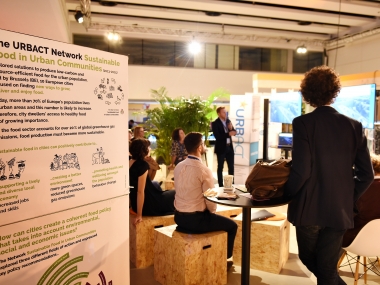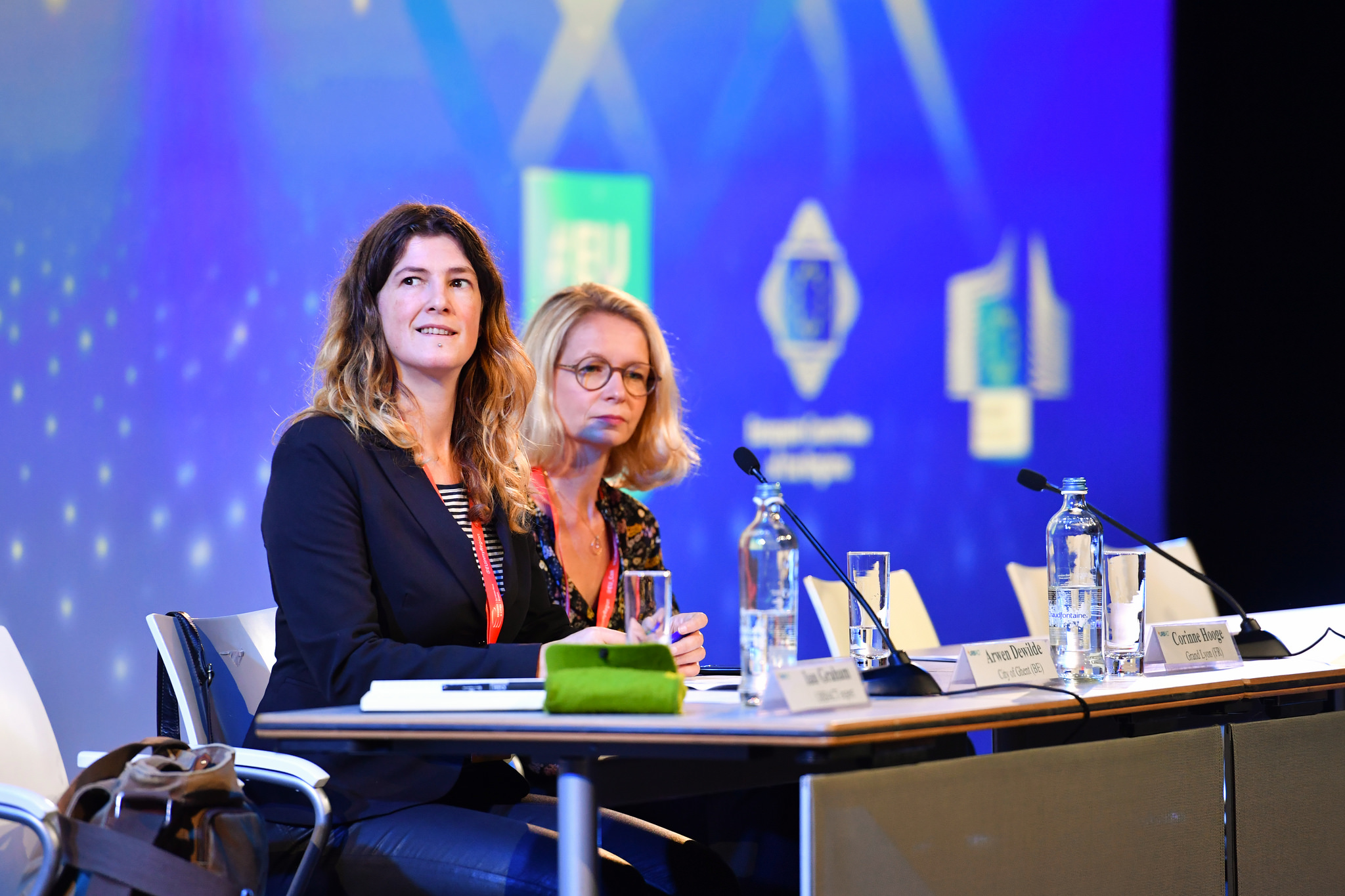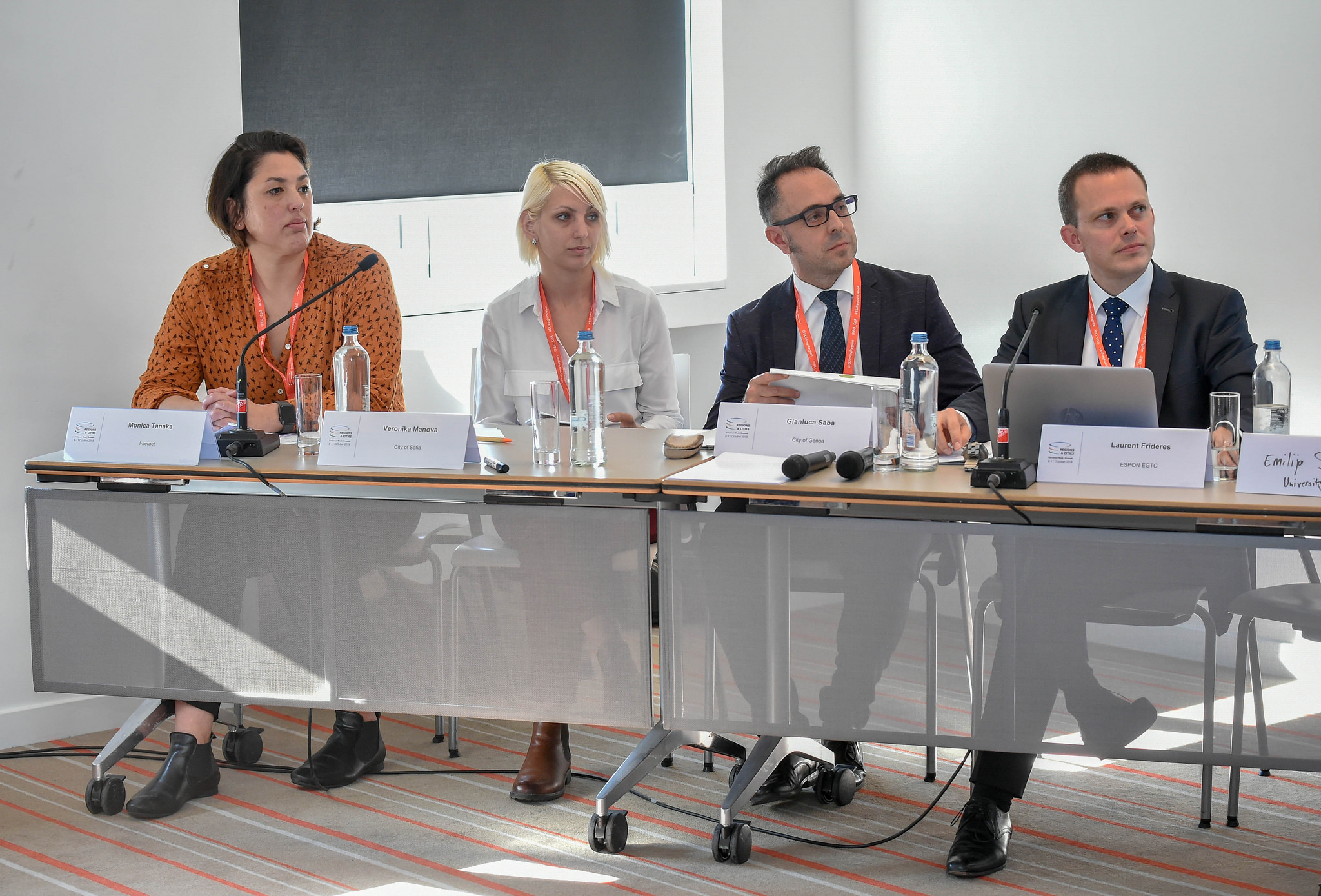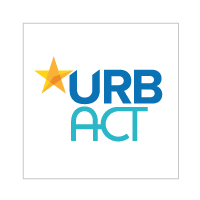URBACT's highlights at the 2018 European Week of Regions and Cities
Edited on
18 November 2019Earlier this month, URBACT was in Brussels for the European Week of Regions and Cities (8-11 October). The programme was featured at the Urban Corner, in the Agora, the exhibition space of the Square Conference Centre.
URBACT also run a session on overcoming implementation challenges to sustainable urban development solutions and contributed to a joint session of the European Territorial Cooperation Programmes on building a user-centric digital public sector.

The European Week of Regions and Cities is the annual event organised by the Committee of the Regions and DG Regional and Urban Policy. Its 16th edition was under the headline of 'For a strong EU Cohesion Policy beyond 2020', with a highlight on regional, urban, rural and territorial development. In this context, URBACT played an important role at the Urban Corner along with other urban-related European programmes and initiatives (the Urban Agenda for the EU, EUROCITIES, the Joint Research Centre -JRC, Urban Innovative Actions -UIA and the European Investment Bank’s URBIS).
The Urban Corner was made of three areas: a Virtual Reality one (showcasing urban challenges and solutions), a Meet & Game corner (where participants were invited to play the Sustainability Challenge Board Game developed by the JRC) and an Open Theatre (for live presentations followed by Q&A). There was also room for networking which allowed exchanges with participants on how URBACT drives change for better cities, especially through the upcoming call for the creation of Action-Planning Networks.
Two cities that have been Lead Partners of URBACT networks shared testimonies on how URBACT helped them turn ideas into action. Ghent (BE) and Genoa (IT) also took part in the sessions (co)-organised by the programme:
- A
 rwen Dewilde from the city of Ghent, who is involved in the Implementation network Stay Tuned which aims at reducing the high urban rates of early school leaving, detailed the challenges the city faces in implementing its strategy. Arwen insisted on the importance of stakeholders' involvement (getting schools on board and building a relationship of trust) and on the necessity of developing their capacities to ensure a joint delivery (inside and outside of schools) of more targeted and personalised measures for youngsters. Likewise, she stressed the need to address the root causes (a different cultural background, a lack of social capital) of the problem.
rwen Dewilde from the city of Ghent, who is involved in the Implementation network Stay Tuned which aims at reducing the high urban rates of early school leaving, detailed the challenges the city faces in implementing its strategy. Arwen insisted on the importance of stakeholders' involvement (getting schools on board and building a relationship of trust) and on the necessity of developing their capacities to ensure a joint delivery (inside and outside of schools) of more targeted and personalised measures for youngsters. Likewise, she stressed the need to address the root causes (a different cultural background, a lack of social capital) of the problem.
Arwen further shared Ghent's experience with URBACT during a workshop focused on tackling implementation challenges (among which integrating different policy areas and monitoring of performance and results). Corinne Hooge from Grand Lyon (FR), a partner in the URBinclusion network addressing poverty in deprived urban areas, also took part in this session moderated by Ian Graham. The moderator's and speakers' key messages on how to deliver change for cities are available here.
- Gianluca Saba, Head of the International Affairs Office at the municipality of Genoa, explained how the city rethought its branding strategy within the URBACT network CityLogo. Genoa deepened its work by then being involved in the Interactive Cities network which explored how digital, social media and user-generated content can improve urban governance. Genoa's involvement in both networks led to an increased visibility for the city with a higher number of tourists visiting every year. In the frame of Interactive Cities, the municipality set up a social media team communicating with citizens to promote the attractivity of the city, a task which proves particularly crucial in a context of crisis recovery (for instance following the deadly bridge collapse which happened this summer).
Gianluca also contributed to exploring issues of digital governance during a session entitled "Towards building a user-centric digital public sector" which gathered key insights from the Urban Agenda Partnership on Digital Transition and the three other European Territorial Cooperation Programmes: ESPON, Interreg Europe and Interact. Find out more about Genoa's experience with URBACT here.
In addition to those city testimonies, Ivan Tosics, one of URBACT's Programme Experts, presented the programme's new online tool, Remaking the City, which aims at helping the public sector discover innovative practices to find new ways of using space in cities. Watch the short video below and visit the platform to learn more about the solutions city practitioners dealing with empty or underused space, monofunctional or deprived areas have developed.
 Submitted by URBACT on
Submitted by URBACT on




